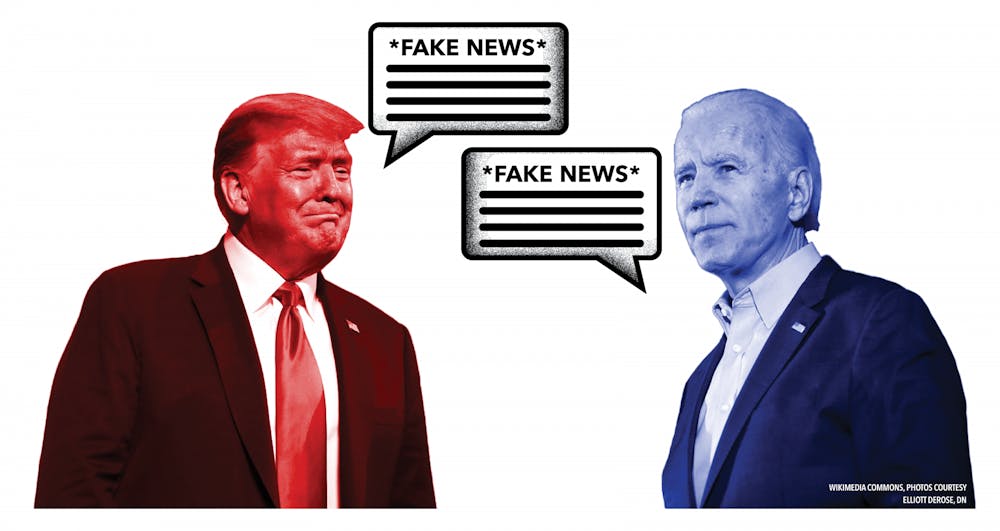
Mackenzie Rupp is a freshman telecommunications major and writes “Political Commentary” for The Daily News. Her views do not necessarily reflect those of the newspaper.
“Fake news” is a term many Americans have come to know all too well. The term is meant to represent false information but has been morphed into a political tool to disavow legitimate journalism as a whole. I became familiar with the term during the 2016 election. My interest in politics and journalism grew together. To me, this November’s election is almost a matter of life and death. If you can vote, please take the time to do so. It will be worth the outcome.
The first notable use of the phrase “fake news” took place in 2014 by Buzzfeed News media editor Craig Silverman when he discovered a site known as the National Report. President Donald Trump picked up on the term during the 2016 election when he called Buzzfeed News a “failing pile of garbage.” Since then, the term has become a political weapon.
The term “fake news” affects both sides of the aisle. It is still being debated on whether or not false information helped Trump win the 2016 election. A recent study by the Knight Foundation, an American nonprofit organization that invests in journalism, suggests that nearly 700,000 fake Twitter accounts were created in 2016 to help spread fake ideas. For Trump, winning the upcoming election would be considered a positive effect of false information.
Trump’s challenger, former Vice President Joe Biden, has been dealing with false information since he announced his campaign. One of the most popular claims taken from Politifact is a debunked QAnon conspiracy theory suggesting Biden is a pedophile, and Trump supporters have gone as far to make shirts for their children that say “Hidin’ from Biden.” These theories have been debunked, and all of this negative attention is an example of a negative effect of fake information.
False information can also impact journalists because about half of all Americans currently distrust any form of journalism. This is something I have personally experienced as a telecommunications major. Comments from family members such as “Remember to stay unbiased” are not uncommon. The increasing use of social media helps fake information spread even faster. The stay-at-home order issued in March of 2020 led to an increased use of social media platforms — with Facebook, Netflix and YouTube having the highest spike in viewership. Facebook usage increased almost 30 percent, which almost definitely helped fake information to spread.
The right-wing audience is older and whiter than any other audience. Pew Research Center reported in an article released in April 2020 that Fox News is what those who identify as conservative like to hear, and people like to hear what they want to hear, so they block out everything else. Of course, the same thing goes for other political parties, but it seems to me Republicans depend on it based on the evidence produced by the Pew Research Center.
All this seems to be a little ridiculous, right? Shouldn’t the incumbent candidate be focused on his own reelection campaign? Right now, it appears to consist of tearing others down, lying — according to a article about a compilation of lies published by “The Atlantic” — and relying on foreign governments to win.
Trump did not invent the term “fake news,” but it seems he has adapted it for his own manipulation. Turning the media into “truly the enemy of the people” is a horrible thing to do and should be a huge concern to the American people. Unfortunately, we are currently in the middle of a pandemic and arguably the most controversial election to ever take place, so the demonizing of the media is not a concern to most people.
This election is so important that people and organizations who hardly ever endorse a candidate are endorsing Biden. The magazine “Scientific American” is endorsing a candidate for the first time in its 175-year history. Public figures are also reinforcing voting as a whole. Entire platforms, like Facebook, have set up resource tools to direct people on their state’s voting laws and regulations. Hopefully, these endorsements mean something to people.
“Fake news” should no longer be seen as funny. It’s a serious problem. Before we know it, false information will be used to rewrite history. Fact-checking sites exist, but what about television news? Radio programs? Conspiracy theory YouTube channels? Fake material needs to be re-evaluated and re-defined to society as just that — fake information, and there is only one way to do that.
Vote.
Contact Mackenzie Rupp with comments at msrupp@bsu.edu or on Twitter @kenzieer18.





The Daily News welcomes thoughtful discussion on all of our stories, but please keep comments civil and on-topic. Read our full guidelines here.